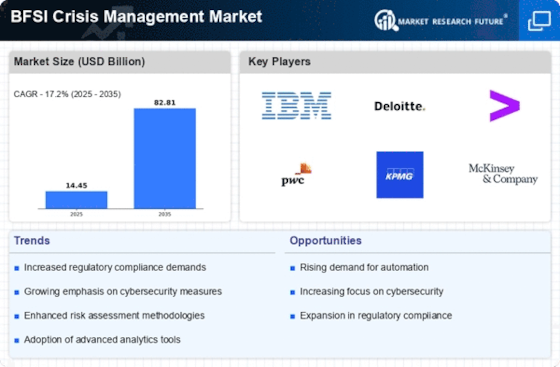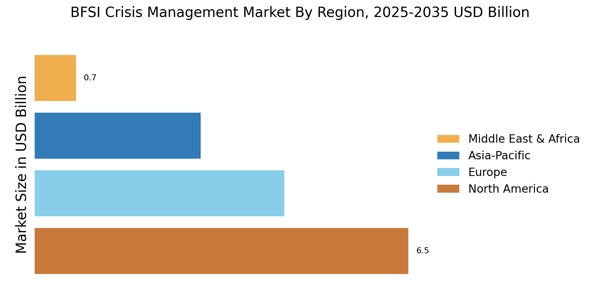Increased Cybersecurity Threats
The BFSI Crisis Management Market is experiencing heightened demand due to the increasing frequency and sophistication of cyber threats. Financial institutions are prime targets for cybercriminals, leading to significant financial losses and reputational damage. In 2025, it is estimated that cybercrime could cost the financial sector over 6 trillion dollars annually. This alarming trend necessitates robust crisis management strategies to mitigate risks and respond effectively to incidents. As a result, investments in cybersecurity solutions and crisis management frameworks are surging, indicating a strong growth trajectory for the BFSI Crisis Management Market.
Regulatory Pressures and Compliance
The BFSI Crisis Management Market is significantly influenced by the evolving regulatory landscape. Financial institutions are under increasing pressure to comply with stringent regulations aimed at protecting consumer data and ensuring financial stability. In 2025, compliance-related expenditures are projected to reach 300 billion dollars, reflecting the critical need for effective crisis management solutions. Institutions must develop comprehensive strategies to navigate these regulations, which often require rapid response capabilities in the event of a crisis. This regulatory focus drives demand for specialized crisis management services within the BFSI sector.
Rising Customer Expectations for Transparency
The BFSI Crisis Management Market is also shaped by rising customer expectations for transparency and accountability. In an era where consumers demand more information about how financial institutions handle crises, organizations are compelled to adopt more transparent crisis management practices. This shift is likely to influence the development of communication strategies that prioritize customer engagement during crises. By 2025, it is anticipated that 60% of financial institutions will enhance their crisis communication protocols to meet these expectations. This trend not only drives demand for crisis management solutions but also fosters trust and loyalty among customers.
Technological Advancements in Crisis Management
The BFSI Crisis Management Market is being transformed by technological advancements that enhance crisis response capabilities. Innovations such as artificial intelligence, machine learning, and big data analytics are enabling financial institutions to predict, identify, and respond to crises more effectively. In 2025, the market for AI-driven crisis management solutions is expected to grow by 25%, indicating a shift towards more proactive and data-driven approaches. These technologies not only streamline crisis management processes but also improve decision-making during critical incidents, thereby bolstering the resilience of the BFSI sector.
Growing Awareness of Business Continuity Planning
The BFSI Crisis Management Market is witnessing a surge in awareness regarding the importance of business continuity planning. Financial institutions are increasingly recognizing that effective crisis management is essential for maintaining operational stability and customer trust. In 2025, it is estimated that 70% of financial organizations will have implemented comprehensive business continuity plans. This trend underscores the necessity for crisis management solutions that can ensure seamless operations during disruptions. As awareness grows, so does the demand for specialized services within the BFSI Crisis Management Market.

















